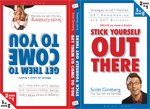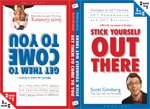 Sean Connery was wrong.
Sean Connery was wrong.
“Shaken, not stirred,” he said to the bartender.
GUESS WHAT: Neither of those are good options.
Sure, they’re fine for martinis.
But not for life.
HERE’S WHY: When tragedy strikes, when heartbreak hits and when tough times settle in, stillness is the only place from which to take profitable action.
Not shaken. Not stirred.
Just still.
That’s how you respond to the crap the world hurls at you.
Whatever pain you’re currently experiencing, here’s a list of helpful practices to make sure you make it out alive:1. Discard the dress of the past. Dwell not on the dreadful torments of what happened. The past is so last week. Stop trying to let go and start allowing yourself to recognize what’s already gone.
Comb the damage field and spot the usefulness of what happened – then move on. Even if that means capsizing your own ship.
You’ll find that doing so isn’t so scary when you’re ready, willing, able and excited to swim. What is your past prologue to?
2. Give yourself permission to feel miserable. Instead of outrunning your truth, consider sitting closer to the things you’re trying to move away from. Like Oriah suggested in The Dance, “Whatever it is you don’t want to be with, confront that.”
Then, if you start to feel like crap, so be it. Let that river flow. It’s normal, healthy and cleansing. Plus, when you respond to your specific human needs of the moment, you end up feeling that much more alive. And then your pain becomes wisdom. “The greater the torment the sweeter the glory,” as Seneca remarked.
That’s the best part: The more it hurts, the more you hear; the more you hear, the more you learn; and the more you learn, the more exquisitely you’re shaped by experience.
But only if you cure your allergy to reality. What’s convenient for your ego is devastating to your existence. Make the right choice. Are you ready to dig a misery hole and jump in with both feet?
3. Maintain a diverse portfolio of happiness. That’s the advice of Scott Adams, creator of Dilbert. “When you do so, nobody or no thing can knock you off course,” he says.
And he’s right: When you assume a baseline posture of abundance, bad situations don’t threaten you. Your challenge is to become more aware of your entire horizon. And know that just because “this sucks,” doesn’t mean, “life sucks.”
Like The Tao of Abundance taught me, “The world you see is a reflection of the condition of your mind.” What’s that world reflecting back to you?
4. Establish an expectation-free support structure. You never know how strong – or how weak – your support structure is until your world crumbles into a million bloody pieces. Your goal is to find:
The people that will provide proactive reassurance.
The people that will be whatever gets you through.
The people you don’t need permission to hate yourself in front of.
Not the seven hundred “friends” you have on Facebook. Those aren’t friends – those are friendlies. And not the thousands of “connections” you have on LinkedIn and Twitter. Those aren’t friends – those are fans. Colleagues. Connections.
I’m talking about your real friends:
The people who know who you really are.
The people who will gladly sit with you in companionable silence.
The people who will enthusiastically carry you to the other side of the wall.
The people who will reflect the best, highest version of who you are.
The people who, if you called them at two in the morning, would answer the phone with, “Are you okay?” and not, “Do you know how late it is?”
Those are your friends. Who has a lifetime pass with you?
5. Make frequent withdrawal requests. Speaking of your friends: Did you know that the people who love you want nothing more than the opportunity to show you how much they love you? Believe it. That’s why they signed up in the first place: To be a source of support.
Next time you find yourself in the throes of mental, physical or emotional affliction, don’t shrink from soliciting that support. Say to people:
“Look man, my life is kind of a shitstorm right now. And I’m gonna be fine, but what I really need is about two hours of your time to talk and vent and cry. What day is convenient for you this week?”
Remember: When you’re tossed and tattered by the fury of the tempest, don’t hesitate the call the Coast Guard. That’s why they’re there. Are you making enough withdrawals from your relationship bank accounts?
6. Approach life creatively, not reactively. Instead of suffocating under the burden of reaction, propel yourself into the heart of creation.
That’s the key to transitioning from victim to victory: It’s all about how you shape your energy. That not only determines if you’ll make it out alive, but also how alive you are when you rise up from underneath rubble.
Remember: There’s a key difference between reacting and responding: The first is a reflex – the second is a choice. Do you face problems or do problems face you?
7. Try not caring in small doses. There’s nothing more liberating saying, “Ah screw it!” – and not feeling guilty afterward. That’s the cool thing about reckless abandon, says Seth Godin: “There is always time to be sensible later.”
My suggestion: Practice a little selective apathy. It’s good for the soul. And I don’t mean blow your life savings at the casino or get pissed at the pub and drive home recklessly. Not caring only works when you do so in a way that doesn’t disrespect or hurt people. Including you.
Look: You’ve been through hell – you deserve this. Find safe places to not care. Just promise not to make it a habit. Are you willing to temporarily become selectively apathetic?
8. Dive into hard work willingly. When you’re downbeaten by the storms of fate, never underestimate the power of staying busy. Learn to disappear. Learn to lose yourself. And learn to let your ego fall away completely.
When you enter into the cocoon of concentration, you release your sense of self. And sometimes that’s the smartest thing you can do: Distract yourself from yourself.
Remember: When you stay insatiably proactive in occupying your mind, body and spirit with activities you enjoy, misery has no choice but to stand in line and wait. Could your schedule be busier this week?
9. Keep pulling your triggers for joy. During my last bout with misery, I took Dave Barry’s advice: “Never stop laughing.”
You might try the same: Keep your funny bone engaged. Humor is, by far, the highest achievement of human eloquence. It’s also your best friend for making it out alive.
Because while hardship forces you in with tears – humor busts you out with happiness. Remember: If you constantly nourish the needs of your soul, nobody can touch you. How many tokens of beauty and joy are present in your life?
10. Allow people to speak into your life. You’ve already learned about support systems and withdrawals. The final component to the interpersonal side of misery management is receiving the voice of others.
Not just their words. Not just their ideas. Their voice. That’s the difference between allowing people to talk about your life and allowing them to speak into your life: One uses vocals, the other uses voice. Remember that distinction.
And one more thing: Whomever you let speak into your life, be sure they’re right people. Otherwise you trap yourself on the endless, sweaty treadmill of being what the wrong people want you to be. And that’s always a crappy workout. Whose voice is speaking into your life?
11. Displace the impact. In a recent blog post, Seth Godin wrote, “In a long distance race, everyone gets tired. The winner is the runner who figures out where to put the tired, figures out how to store it away until after the race is over. Sure, he’s tired. Everyone is. That’s not the point. The point is to run.”
That’s the hallmark of heroic misery management: Displacing the impact. Like the martial arts master who practices how to somersault over the concrete, your challenge is to find somewhere else, some other use, for the heartsickness you feel.
Personally, I use my misery to inform my work. As a writer, I don’t just put pen to paper – I put pain to paper. I write the tired out of me. And as a result, my books aren’t printed with ink – they’re printed with blood. Which makes for a hell of an interesting read.
Remember: Creativity is the indispensible instrument for enduring poverty. How will you displace the impact of your pain?
REMEMBER: Not shaken. Not stirred. Just still.
That’s how you make it out alive.
James Bond was an rookie.
LET ME ASK YA THIS…
What will you drink to stay still?
LET ME SUGGEST THIS…
For the list called, “11 Ways to Out Market the Competition,” send an email to me, and you win the list for free!
* * * *
Scott Ginsberg
That Guy with the Nametag
Author, Speaker, Entrepreneur, Mentor
[email protected]
 The world’s FIRST two-in-one, flip-flop book!
The world’s FIRST two-in-one, flip-flop book!
Buy Scott’s comprehensive marketing guidebook on Amazon.com and learn how to GET noticed, GET remembered and GET business!

 “Your attitude is the only difference between an ordeal and an adventure.”
“Your attitude is the only difference between an ordeal and an adventure.” The world’s FIRST two-in-one, flip-flop book!
The world’s FIRST two-in-one, flip-flop book!